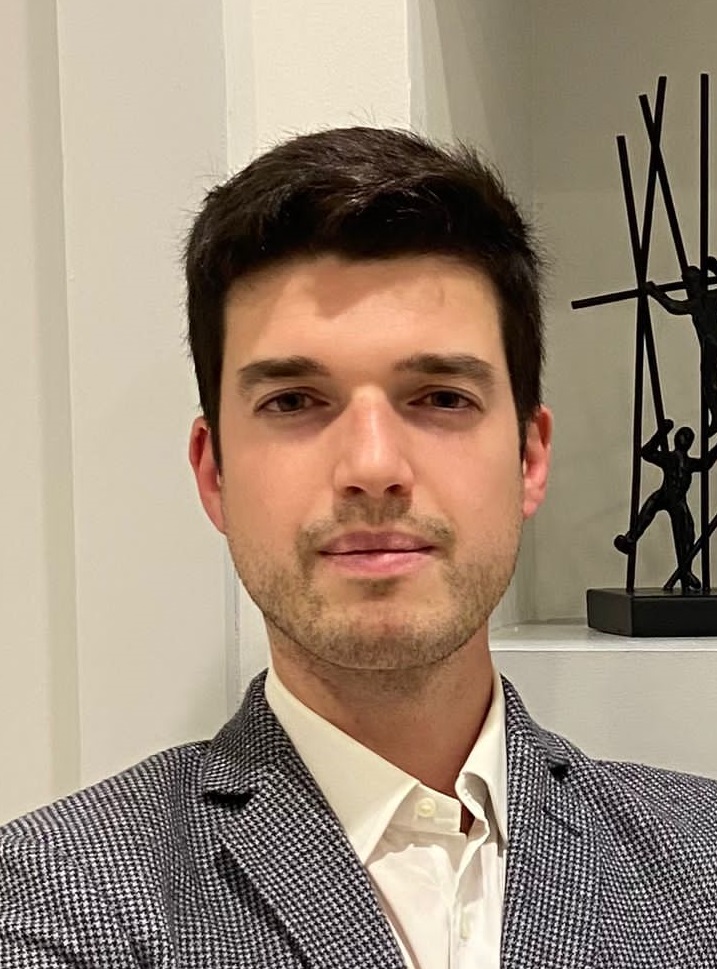
Matteo Borgini
Assistant Professor

Matteo Borgini
Assistant Professor
Academic Appointment(s)
Administration
Department of Chemistry and Biochemistry
College of Science and Mathematics
Department of Chemistry and Biochemistry
Bio
Dr. Borgini graduated from the University of Siena, Italy, in 2015 and received his PhD in Chemical and Pharmaceutical Sciences under the supervision of Professor Maurizio Botta. During his PhD studies he worked on the synthesis of epigenetic modulators as anticancer agents, host protein inhibitors as antiviral compounds, and developed new antifungal drugs. He then pursued his Postdoctoral studies with Professor Peter Wipf at the University of Pittsburgh, USA. During that time, Dr. Borgini developed new ways to access fluorinated as well as 13C-labeled amino acids exploiting C-H functionalization, complex heterocyclic compounds by transition-metal catalyzed annulative cleavage of bicyclo[1.1.0]butane dihydroquinolines and dihydropyridines, and developed mitochondria-targeted PARP-1 inhibitor prodrugs as potential neuroprotective agents. Dr. Borgini started his independent career at Augusta University, USA, as Assistant Professor in Medicinal Chemistry at the Department of Chemistry and Biochemistry. The Drug Discovery campaigns in the Borgini Lab are aimed to find new ways to chemically modulate biological targets considered "difficult to drug", advancing new medicinal chemistry tools including Protein-Protein interaction Inhibitors and Covalent Inhibitors.
- MBORGINI@augusta.edu
- (706) 721-8746
- GE 3055
- Personal Website
Education
-
MS, Chemistry, General University of Siena, 2020
-
Ph.D., Chemistry, General University of Siena, 2020
Awards & Honors
-
Poster Award UPMC Hillman Cancer Center , 2022
-
Travel Fellowship Award COST action CM1406 “From Molecule to Medicine”, 2019
-
Travel Fellowship Award The European Cooperation in Science and Technology, 2019
-
Travel Fellowship Award The European Cooperation in Science and Technology, 2019
-
Doctoral fellowship UNAVIR, 2016
Courses Taught Most Recent Academic Year
-
CHEM 2990
Intro to Research
-
CHEM 6990
Masters Research
-
CHEM 3411
Organic Chemistry I
-
CHEM 3411L
Organic Chemistry I Lab
-
CHEM 3411R
Recitation Organic Chemistry 1
-
CHEM 6980
Research Proposal Development
-
CHEM 4990
Undergrad Research
-
CHEM 3990
Undergraduate Research
-
CURS 2990
Undergrad Research I
-
CURS 3990
Undergrad Research II
Teaching Interests
I primarily teach Organic Chemistry I (CHEM 3411), Organic Chemistry I Laboratory (CHEM 3411L), and the accompanying Recitation (CHEM 3411). My instructional approach emphasizes the integration of fundamental principles with real-world chemical and biological applications, encouraging students to connect organic chemistry concepts to contemporary challenges in science and medicine.
Scholarship
Selected Recent Publications
- State-of-the-art Nrf2 Inhibitors: Therapeutic Opportunities in Non-cancer Diseases, 2024
Manuscript - M. Borgini, P. Wipf. Synthesis and Rhodium(I)-Catalyzed Annulative Cleavage of Bicyclo[1.1.0]butyl Dihydroquinolines and Dihydropyridines, ChemRxiv, 2023, DOI: 10.26434/chemrxiv-2023-rnqhm, 2023
Journal Article, Academic Journal - M. Borgini, P. Wipf. Synthesis of Veliparib Prodrugs and Determination of Drug-Release-Dependent PARP-1 Inhibition, ACS Medicinal Chemistry Letters, 2023, 14(5), 652-657., 2023
Journal Article, Academic Journal - Synthesis of 13C-methyl-labeled amino acids and their incorporation into proteins in mammalian cells, 2023
Journal Article, Academic Journal - M. Borgini, P. Wipf. Stereoselective synthesis of δ-fluorinated isoleucines exploiting consecutive C(sp3)-H bond activations, Tetrahedron, 2022, 120, 132876. Special issue in Honor of Dr. Franziska Schoenebeck., 2022
Journal Article, Academic Journal
Research Interests
My research centers on the design and development of small molecules that modulate protein function. One major focus of my work is the development of novel electrophilic moieties for covalent inhibitors. Covalent inhibitors have emerged as powerful therapeutic agents capable of engaging proteins previously considered “undruggable”, such as KRAS(G12C), which drives certain types of cancer. My group designs new electrophiles for covalent inhibitors using strain-release transformations. These studies aim to expand the chemical space of covalent inhibitors and advance drug discovery.
A second research direction involves developing selective inhibitors of the master regulator of antioxidative responses, Nrf2. Aberrant Nrf2 activation enables cancer cells to survive oxidative stress and resist therapy. By targeting the Nrf2–KEAP1 regulatory axis, our work seeks to uncover new approaches to sensitize cancer cells to treatment and overcome drug resistance.
Department Service
-
Graduate Faculty Research Committee 2023 - Present
Role: Committee Member